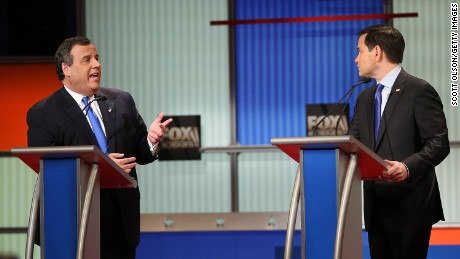(CNN)First-term Florida Sen. Marco Rubio has always had the potential to bridge the fractured Republican Party: He is conservative enough, his backers say, to win over the party's disgruntled base, yet politically savvy enough to connect with establishment donors and business interests.
Yet he has struggled to win a state in the early going and consolidate the "establishment" vote of the GOP.
Immigration outlier
In particular, Rubio has struggled to put away concerns over his past support for a pathway to citizenship for some undocumented immigrants, a position anathema to much of the Republican base.
But he's earned the backing of many of the GOP's leading donors and fundraisers, who envision the 44-year-old Hispanic politician from a large swing state as a perfect-on-paper contrast to Democratic candidate Hillary Clinton.
Rubio's strong political positioning was not self-evident when he announced his bid in April. Early national surveys showed him with only middle-of-the-pack polling, and his path to winning top endorsements from traditional party leaders seemed blocked by a fellow Floridian, former Gov. Jeb Bush, who has since dropped out.
But supporters dismissed concerns about his middling polling position and relatively thin resume after hearing him speak.
Alfredo Ortega, chief of staff for the city of Doral, Florida, said he believed because Rubio is a "phenomenal politician" he could overcome many of the hurdles he faced.
Ortega, who came to America from Venezuela 11 years ago, said he saw Rubio's ability to win support from both the "Anglo and Hispanic worlds" as one of his major assets.
And it's that eloquence, then said Florida GOP strategist Rick Wilson, who now works for a pro-Rubio super PAC, that would help Rubio overcome the "static" in the field.
"Marco Rubio has a certain fluency, and ability to connect with voters, and this will be one of the first times a wider audience has seen it," said Wilson.
A tea party past
Rubio faced the challenge of maintaining establishment interest while growing his appeal among conservatives. The right remains wary of Rubio for partnering with Democrats on an ultimately failed immigration reform bill after riding into office on the 2010 tea party wave.
But Rubio is looking to carve out a path as the candidate who's not too far right to lack credibility nationally, and yet not too squishy on conservative priorities such as guns and same-sex marriage to lose the Republican base.
Rubio has eschewed the bomb-throwing of conservatives such as Texas Sen. Ted Cruz and real estate mogul Donald Trump and the vacillations of some of the party's more establishment-minded candidates.
His career in politics -- which began with a stint as West Miami city commissioner and found him ascending to House speaker before his upset U.S. Senate win in 2010 -- has been centered on pragmatism, supporters say.
He was the first in the 2016 field to declare, without reservations, that parents "absolutely" should vaccinate their children. He repeatedly asserted that it was impossible to defund President Barack Obama's immigration executive order by shutting down the Department of Homeland Security.
Focus on foreign policy
But on other issues -- particular foreign policy -- Rubio has railed against the administration. He led the charge against the Obama administration's move to thaw relations with Cuba last year, appearing on nearly every major news network to slam the policy shift as shortsighted and scheduling hearings as chairman of the Senate Foreign Relations Western Hemisphere Subcommittee on the issue.
It gave him an opportunity to emphasize his personal narrative as the son of Cuban immigrants and his lifelong criticism of the Castro regime.
And it was yet another chance for Rubio to stake a claim as the GOP's strongest candidate on foreign policy, which Republicans believe will become a defining issue in the primary and general elections.
The senator has been working since his early days in office to build the experience to make that case. As of last year, he'd taken 12 trips abroad since 2010 and co-sponsored more than a dozen bills on issues ranging from Russia's aggression against Ukraine to humanitarian crises in Haiti.
He is a frequent and prominent critic of Obama's plan to tackle ISIS and has slammed the Iran deal as insufficient to prevent the nation from gaining nuclear weapons.































































